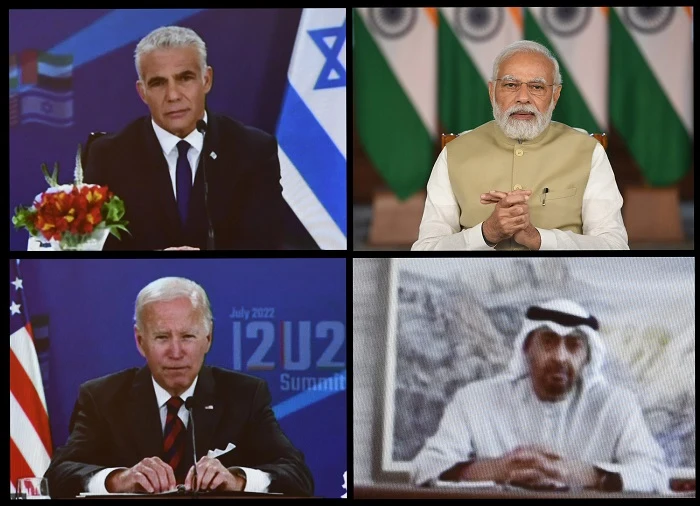Focusing on the food security crisis and clean energy, the leaders of India, Israel, United Arab Emirates, and the United States (I2U2) today announced not only an investment of $2 billion to develop a series of integrated food parks across India but also the setting up of a $330 million hybrid renewable energy project in Gujarat.
Prime Minister Narendra Modi and the UAE President Sheikh Mohamed bin Zayed Al Nahyan joined the inaugural meeting of the unique grouping virtually with US President Joe Biden – currently on a tour of the Middle East – and Israeli PM Yair Lapid sitting together at the Waldorf Astoria hotel in Jerusalem Thursday afternoon.
Calling it a meeting of "strategic partners in the true sense" who are "good friends too", PM Modi said that all four countries have a common perspective and common interests as well.
He mentioned that the I2U2, which has a "progressive and practical" vision and agenda, has identified joint investment in six key areas of water, energy, transport, space, health and food security.
"By mobilizing the mutual strengths of our countries – Capital, Expertise and Markets – we can accelerate our agenda, and contribute significantly to the global economy. Our cooperative framework is also a good model for practical cooperation in the face of increasing global uncertainties," said PM Modi in his opening address.
That India, one of the fastest growing major economies in the world, will be at the centre of the long-term strategic partnership – described as the West Asia Quad by many – is evident from the two major initiatives announced by the I2U2 leaders on Thursday.
The first, as reported by IndiaNarrative.com earlier, is UAE investing $2 billion to develop agricultural parks in India to ensure longer-term, more diversified food production and food delivery systems that can better manage global food shocks. The parks will incorporate state-of-the-art climate-smart technologies to reduce food waste and spoilage, conserve fresh water, and employ renewable energy sources.
As the joint statement mentioned, while India will provide land for the project and will facilitate farmers' integration into the food parks, the US and Israeli private sectors will be invited to lend their expertise and offer innovative solutions that contribute to the overall sustainability of the project. These investments will help maximize crop yields and, in turn, help tackle food insecurity in South Asia and the Middle East.

(Image courtesy: Ministry of Foreign Affairs, Israel)
Biden said that the integrated agricultural parks project has the potential to sustainably increase India's food yields in the region threefold in just five years.
"India is a major, major food producer in the world. Think of the beneficial impacts this will have on India's farmers and the people suffering from hunger and malnutrition in the region," said the US President.
The second initiative announced by the four leaders will see a hybrid renewable energy project consisting of 300 MW of wind and solar capacity complemented by a battery energy storage system being established in Gujarat.
The US Trade and Development Agency funded a feasibility study for the $330 million USD project while the UAE-based companies are exploring opportunities to serve as critical knowledge and investment partners. Israel and the United States intend to work with the UAE and India to highlight private sector opportunities.
"Indian companies are keen to participate in this project and contribute to India’s goal of achieving 500 GW of non-fossil fuel capacity by 2030. Such projects have the potential to make India a global hub for alternate supply chains in the renewable energy sector," emphasised the I2U2 joint statement.
The four leaders affirmed that these are only the first steps in a long-term strategic partnership to promote initiatives and investments that improve the movement of people and goods across hemispheres and increase sustainability and resilience through collaborative science and technology partnerships.
Remembering how it was born in October last year after the meeting between the foreign ministers of the four countries, Lapid made it clear that the I2U2 is not a "philanthropic group" and that the members want to change the world for the better.
"This group is interesting because we are four very different countries, but when we started talking, it became clear we all want the same things: for our children to be warm in the winter, for them to have food on the table and clean water from the tap, for them to enjoy a quality education and advanced healthcare and transportation infrastructure. We also want to reduce the damage our generation inflicted on climate and the environment," said the new Israeli PM.
Also Read: I2U2 Leaders’ Summit: Stage set for a $2 billion agri-parks project in India to tackle food crisis




















